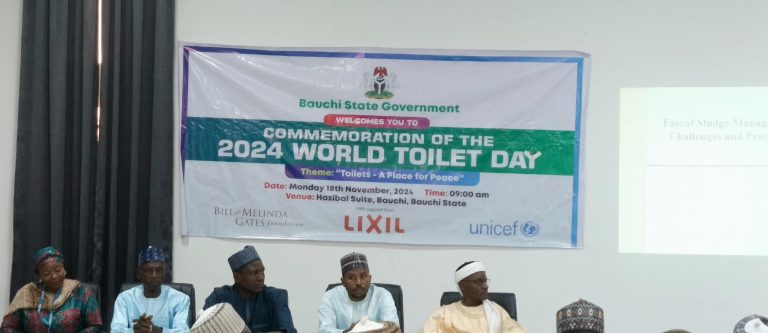The United Nations Children’s Fund (UNICEF) has declared that for millions of people around the world, the lack of access to safe sanitation is a daily struggle, affecting health, education, and economic opportunities.
UNICEF also lamented that poor sanitation increases the risk of life-threatening diseases, especially among children and adolescent girls, while safe and hygienic toilets are a foundation for good public health conditions, vital to reduce diseases, protect water sources, and promote safety, especially for children, women, and girls.
The assertion was made by the Chief of Field (CFO), Bauchi UNICEF Field Office, Dr. Nuzhat Rafique, at the commemoration of the 2024 World Toilet Day held in Bauchi on Monday.
Represented by Dawap Nanbam Michael, WASH Officer, Nuzhat Rafique stated, “When communities have access to good toilet systems, open defecation, a major environmental problem, becomes a thing of the past.”
She stated, “I am delighted to join you all here today to observe the 2024 World Toilet Day, a day dedicated to raising awareness of the global sanitation crisis and the importance of safe toilets for all. This year’s theme, ‘Toilets for Peace, reminds us that access to toilets is essential not only for health but also for dignity, equality, and peace in our communities.
According to her, “The availability of safe and hygienic toilets plays a crucial role in ensuring safe and healthy communities. One gram of human waste can carry millions of harmful bacteria, viruses, and parasites. These pathogens spread through air, water, flies, and animals, contaminating our food and water sources and endangering our health.”
The UNICEF CFO added, “In fact, open defecation can lead to outbreaks of diseases like cholera, which remains one of the leading killers of children. Beyond the immediate health impacts, open defecation affects every part of daily life—children miss school, families spend hard-earned money on healthcare, and time that could be spent on productive ventures is often lost due to illness. These issues create a cycle that keeps families in poverty and prevents children from reaching their full potential.”
She stressed that “I am delighted to know that Bauchi local government has been recently validated as open defecation-free. I congratulate the Bauchi State for its tremendous achievement.”
According to her, “With the generous support of Lixil and the Bill & Melinda Gates Foundation, UNICEF is proud to have collaborated with the Bauchi State Government and other partners to achieve this significant milestone. We commend the unwavering commitment of the state government, local leaders, and communities, and we encourage the other nine Local Government Areas in Bauchi that have achieved ODF status to sustain their efforts for lasting impact Moreover, with a strong focus on Sanitation Marketing Strategy, Bauchi has become the first state in Nigeria to launch a Fecal Sludge Management Implementation Guideline. This is a remarkable achievement that reflects Bauchi’s dedication to improving sanitation for its children and women.”
“While we push forward in making sure people have access to and use safe and hygienic toilets, we must also focus on the complete sanitation value chain—containment. transportation, and recycling,” she added.
The UNICEF CFO added that “investment in this chain can create significant opportunities for job creation and economic growth. We encourage the government to provide an enabling environment where private sector investment in sanitation can thrive. We also call on our traditional and religious leaders to continue educating the communities on the importance and benefits of an open-defecation-free environment.”
She then called ” Let us commit to advocating for safe sanitation for all, building healthier and more peaceful communities where everyone’s basic needs are met with dignity and respect. Let us work together towards a cleaner, healthier, and more prosperous Bauchi State.”
Speaking earlier, Bauchi State Commissioner of Water Resources, Abdulrazak Nuhu Zaki, stressed the importance of WASH protocols in promoting healthy living in society, which he said the state government is trying to ensure.
Represented by the Permanent Secretary of the Ministry, Engr. Samaila Tela, the Commissioner assured that the government is doing everything possible to promote effective Faecal Sludge Management (FSM) implementation.
He said that to achieve the set objectives of FSM, a Technical Working Group (YWG) will be inaugurated, while UNICEF will hand over some innovations to aid the stopping of open defecation in the state.
According to him, “If open defecation is defeated in the communities, there will be healthier people, and the economy will be boosted as the money that will be used for drugs will be redirected to business.”
The Commissioner commended UNICEF, WaterAid Nigeria, and other partners for supporting the government’s efforts in achieving the open defecation-free status of nine LGAs in the state out of the 20, assuring that others will soon join.
In a remarks, WaterAid Nigeria commended the state government for creating an enabling environment for a healthy environment through the encouragement of WASH protocols and availability.
Head of Programme, WaterAid Nigeria, Nanpet Chuktu, assured that WaterAid Nigeria will always support moves that will ensure healthy living by the communities.
During the celebration, Bauchi LGA was announced as one of the Nine LGAs in the state that have now been declared Open Defecation Free (ODF).
ALSO READ THIS TOP STORY FROM NIGERIAN TRIBUNE
Get real-time news updates from Tribune Online! Follow us on WhatsApp for breaking news, exclusive stories and interviews, and much more.
Join our WhatsApp Channel now
